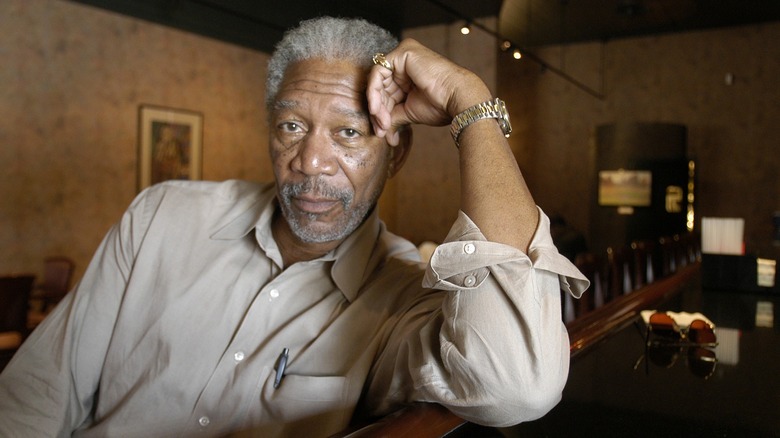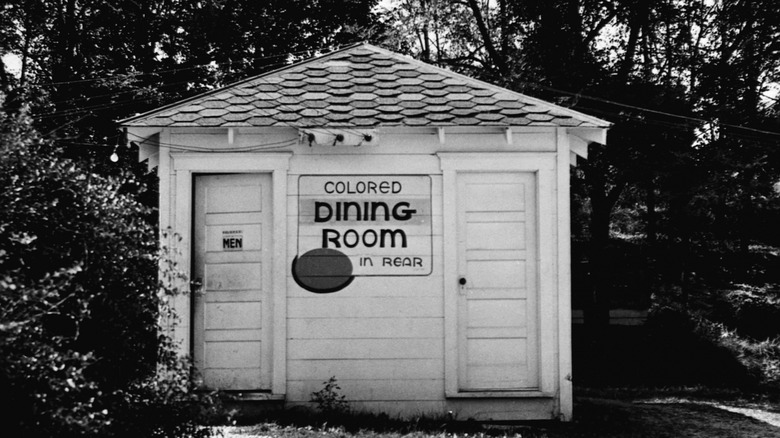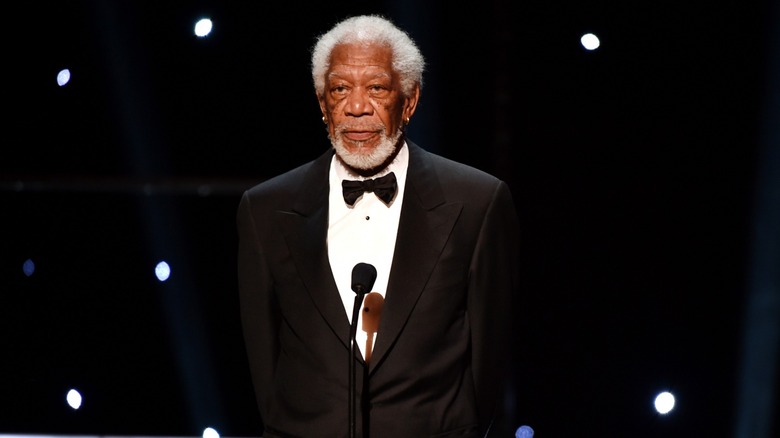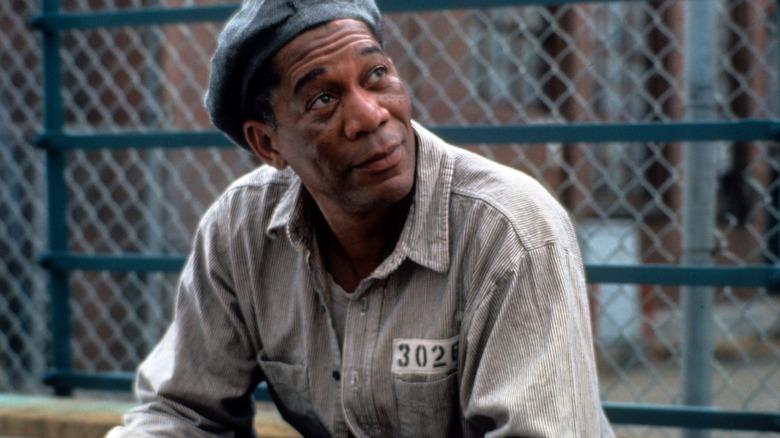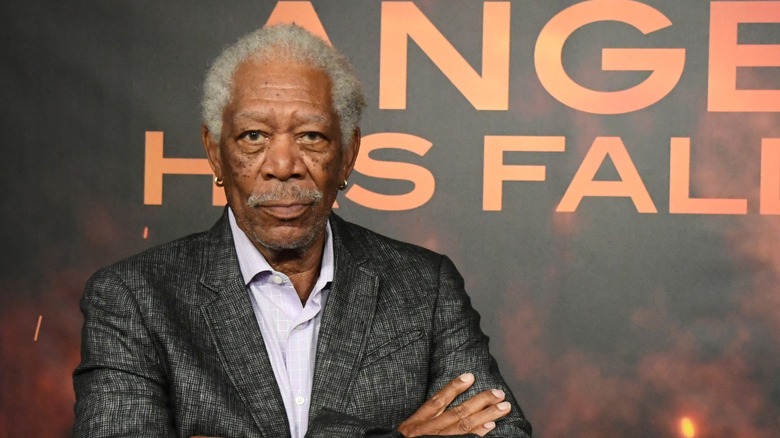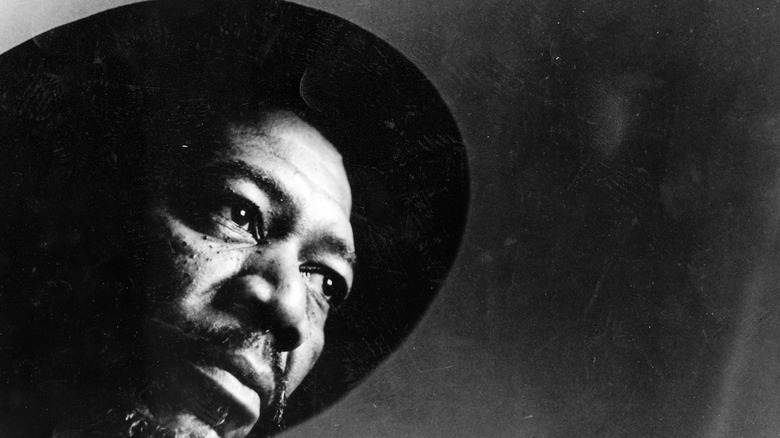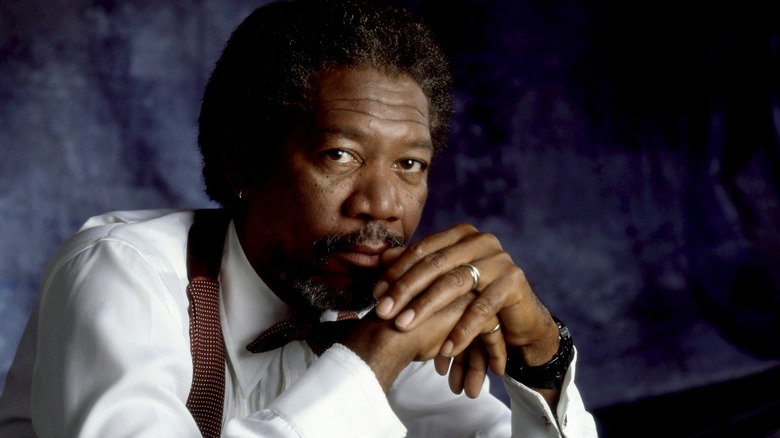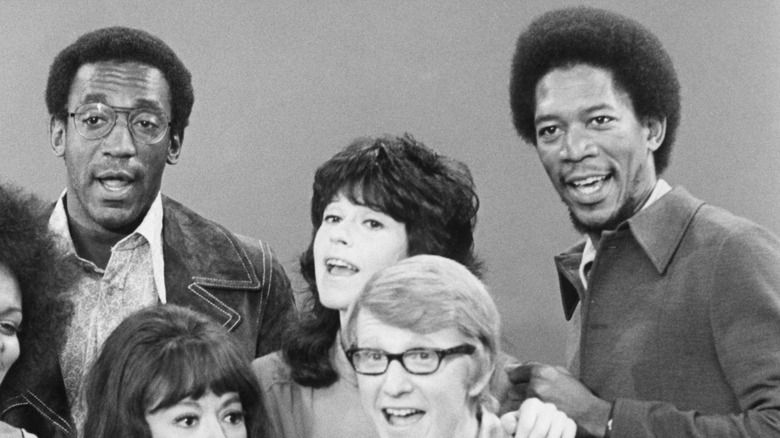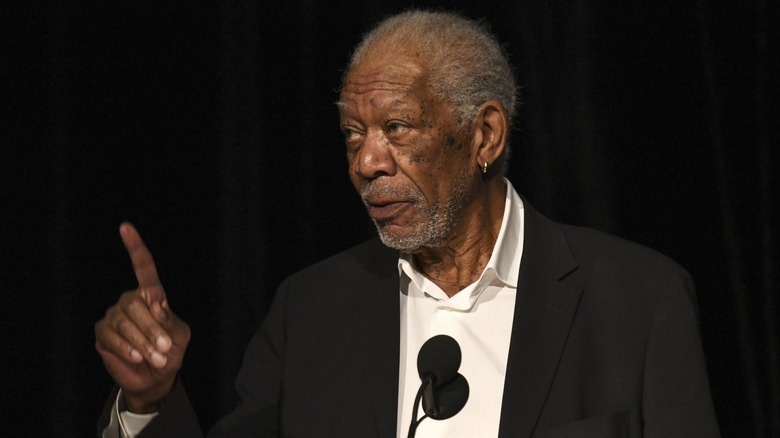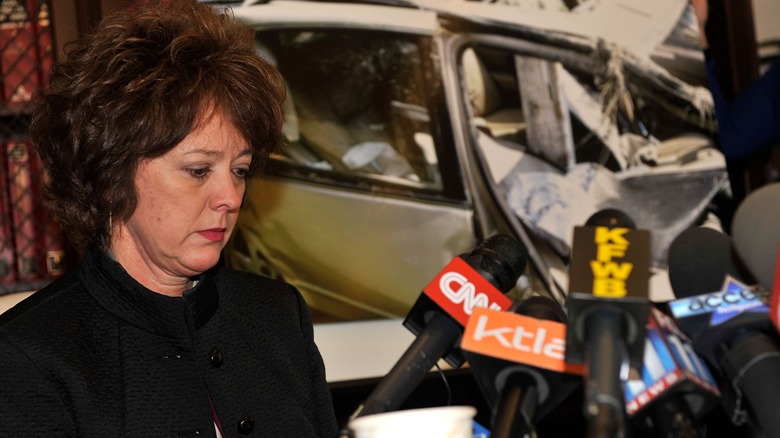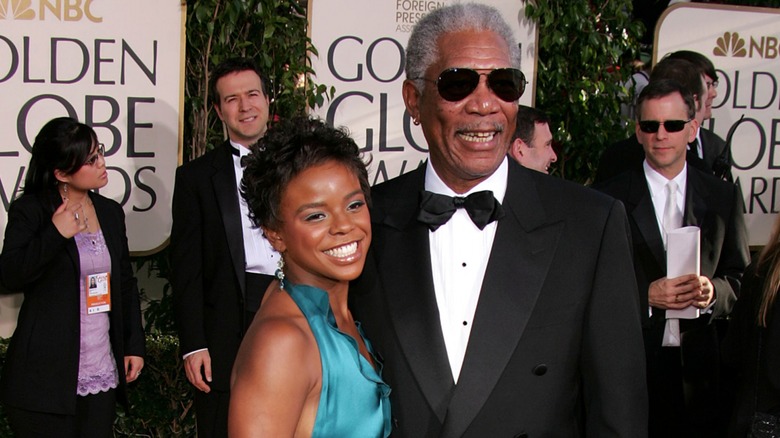Tragic Details About Morgan Freeman
For several decades, Morgan Freeman has enchanted audiences with his outstanding performances and endeared himself as one of the most beloved entertainers in modern American cinema. Born in 1937 in Memphis, Tennessee, Freeman had a brief career in the U.S. Air Force in the 1950s before turning to acting in the 1960s. In 1971, he was cast in his first big role as Easy Reader on "The Electric Company," an educational children's TV show that he would eventually appear in 780 episodes of.
Freeman made the shift into more dramatic and adult roles in the 1980s, highlighted by performances in classic films like "Brubaker," "Driving Miss Daisy," and "The Shawshank Redemption." His first Oscar nomination came in 1988 for the film "Street Smart," and he won the award in 2005 for his role in "Million Dollar Baby." Freeman is one of the rare actors who has the range and depth to play everything from a Civil War soldier ("Glory"), to a school principal ("Lean on Me"), to even civil rights hero Nelson Mandela ("Invictus").
Yet, even though Freeman has experienced some of the biggest highs that Hollywood can offer, his life has not been without tragedy. At a young age and throughout his life, Freeman has had to deal with racism at times, and he has also lost many loved ones, including one to senseless and horrific violence. Still, Freeman has managed to keep going and continue producing some of the most timeless movies ever, a testament to his incredible character.
Freeman grew up in the Jim Crow south
On June 1, 1937, Mayme Edna Revere Freeman and Morgan Porterfield Freeman Sr. welcomed their newest son Morgan Freeman Jr. to the family. He was born in Memphis, Tennessee, and his parents moved north to Chicago when he was 2 years old, leaving him in the care of his grandmother in Mississippi. They moved to look for better economic prospects, as the South at that time was still soaked in legal racism, limiting their job opportunities.
For the next four years, Morgan Jr. grew up in Mississippi at a time when Jim Crow Laws were still on the books. Some of these laws included it being illegal to write about social equality between Black and white residents, interracial marriage being illegal, and the educational system was also horribly unequal, too. In some school districts, the legislature deliberately underfunded schools that Black children like Morgan Jr. attended, purposefully only giving them money to stay open for four months instead of the traditional nine.
The school that Morgan Jr. attended in Greenwood, Mississippi, when he was 6 was so underfunded it only had one room (via Gina DeAngelis in "Morgan Freeman"). Freeman recalled that Mississippi was a "society that was purposefully, obviously, openly segregated," but said his youthful ignorance partially insulated him from the realities of racism (via Kathleen Tracy in "Morgan Freeman: A Biography"). Freeman would soon leave Jim Crow and move north, but his childhood in Mississippi certainly impacted his life.
His grandmother's death devastated him
When Morgan Freeman was just 2 years old, he came to live with his father's mother, Evelyn Freeman, in Charleston, Mississippi. For the next four years, Morgan lived at his grandmother's house with his older sister, Iris Virginia Freeman. He would still see his parents in Chicago during the summers, but every fall, he would always return to grandma's house to begin the school year anew.
Sadly, that came to an end when Morgan was 6 and Evelyn passed away. Not only was Freeman devastated by losing his grandmother, whom he was very close with, but her loss also portended even more anguish by making him move full-time to Chicago with his parents. Morgan hated the cold weather in Chicago, compared to the year-round warmth of Mississippi, and he also was not accustomed to the urban environment that differed so much from his rural upbringing in the Charleston countryside.
In Chicago, Morgan's family lived in the neighborhood known as Bronzeville on the South Side. Bronzeville had been the site of horrific violence just a few decades prior, during the race riots of the Red Summer of 1919, and it was relatively impoverished by the time Morgan moved there in the 1940s. Morgan loved his time in Mississippi far more than in Chicago, mostly because he was around his grandma and had much more fun, and he may have never left it if not for her passing.
As a teenager he almost drowned to death in Mississippi
As a teenager, Morgan Freeman spent some of his time in Mississippi, but one hot afternoon, he nearly got himself into a deadly predicament. Freeman and his friend were hiking in the Mississippi hills, when they found a pond that promised to offer some relief from the pounding sun (via Gina DeAngelis in "Morgan Freeman"). The two of them jumped in but Freeman had difficulty swimming, and as a result, he nearly drowned. Luckily, a few bystanders were able to grab ahold of him and drag him out of the water, or else he probably would have died.
Still, Freeman was far from okay. He was put in the hospital the next day after his condition did not improve, and they realized he was severely malnourished. Part of this was due to the impoverishment of his family, as he claimed to at times not have enough money to eat. For two weeks Freeman had to stay in the hospital as he dealt with both pneumonia and an abscessed lung caused by the pond incident.
His mother was there to help nurse him back to health, but it wore her out doing so. Freeman was only a teenager at the time and still in school, and the incident very nearly cost him his life, but thankfully he was able to survive without any lifelong injuries or problems.
He was once a gang member
Considering his persona, it might sound pretty far-fetched today, but Morgan Freeman was once in a street gang. His membership was the result of Freeman growing up on Chicago's impoverished South Side, where violence was rampant and which he would refer to as "an untenable situation" (via Kathleen Tracy in "Morgan Freeman: A Biography"). According to Freeman, he had to do some initiations to get into the gang, which involved him committing some crimes, but his heart was never in it and he abhorred the inherent violence of gang life.
Gang life was so bad that Freeman at times wished that he was back in Mississippi, even if it meant dealing with the more overt racism of Jim Crow. According to Gina DeAngelis in "Morgan Freeman," the name of Freeman's gang was "the Spiders." He was a reluctant member who only joined because the gang offered protection in the rough and tumble South Side neighborhood he grew up in. Freeman was apparently not a full member of the gang, but did more than enough to be associated with them and earn their protection.
If Freeman had it his way, he would have just stuck to himself and minded his schoolwork, but that was not an option in his neighborhood. Fortunately for Freeman, he did not get caught committing any serious crimes, or his film career may have never had the chance to begin.
He barely knew his father
One of the most tragic parts of Morgan Freeman Jr.'s childhood and young adulthood was his unfortunate relationship with Morgan Freeman Sr., his father. It was not until he was six years old, during Thanksgiving, that Morgan Jr. saw his father for the first time, when he was home on leave from fighting in World War II (via Henry Louis Gates in "In Search of Our Roots"). The meeting did not go well, and Morgan Jr. recalled his father being "a mean man."
This happened right around the time that Morgan Jr.'s grandmother died, which caused him to briefly move in with his father, who had returned from the army after he and Morgan Jr.'s mother had gotten a divorce. Morgan Jr. called living with his father one of the "really low points" in his life, and he said that he "never liked him."
Things were so bad with his father that he only lived with him for six months, before permanently moving back in with his mother and rarely seeing him afterward. The few times he did it was for a haircut — his dad was a barber — and to get a few dollars to give to his poor mother, but Morgan Jr. hated seeing him. Morgan Sr. eventually died in 1961, at the relatively young age of 47, from liver cirrhosis caused by years of excessive alcohol drinking. Morgan Jr. was only 24 years old when his father died, and the two never made amends or reconciled.
Racism caused him to leave the Air Force
When Morgan Freeman graduated high school, he initially turned down the opportunity to pursue his acting career. Offered a scholarship to Jackson State University to join the theater program there, Freeman instead opted to go a completely different route and enlist in the U.S. Air Force. Joining the Air Force was a pragmatic decision by Freeman, who wanted to leave Mississippi and figured it would be a safer career path than acting. Most of his family were also veterans, which was another reason that spurred him to join, and he was in the service for just under four years.
However, while Freeman had aspirations about being a jet fighter pilot, racism stood in his way. At the time that Freeman was in the Air Force – the 1950s — racism was rampant, and it was still years before the federal Civil Rights Act of 1964 ensured legal equality. Even though he did well and tested highly, Freeman was never able to advance above being a radar mechanic, and he has blamed not getting the chance to try out as a pilot on being Black.
In addition to being denied the opportunity to be a pilot, superiors would also make racist comments to him, like insinuating that Black people were typically unkempt. Freeman ended up leaving the Air Force in 1959, just a few years before the U.S. entered the Vietnam War.
He dealt with alcoholism
In the 1970s, while Morgan Freeman appeared to be on his way to superstardom after landing the role of Easy Rider on "The Electric Company," his private life was not going so well. According to an interview Freeman gave in 1989 with The Washington Post, while he enjoyed being on the show and liked the cast, it also caused him to descend briefly into alcoholism. He did not like the constant association he had with the show, where people would recognize him as Easy Rider the character, rather than as Morgan Freeman the actor.
He went from drinking at lunch to bringing it home with him after he was done shooting, and martinis turned into scotch and whiskey. At one point, he was going through a few quarts of whiskey a week, and was blacking out from drinking so much. In addition to the physical toll it was taking, the excessive drinking and unhappiness with the show also began to affect his marriage, which would later end in divorce in 1979. He quit drinking in the mid-1970s, just before "The Electric Company" stopped airing.
Later in his career, Freeman was able to draw on his knowledge of being an alcoholic when he played a substance use counselor in the 1988 movie "Clean and Sober." Freeman has since replaced alcohol with marijuana, which has allowed him to continue his acting career.
If you or anyone you know needs help with addiction issues, help is available. Visit the Substance Abuse and Mental Health Services Administration website or contact SAMHSA's National Helpline at 1-800-662-HELP (4357).
In the beginning he was literally a starving artist
While Morgan Freeman might be one of the most successful and highest-paid actors in Hollywood today, that was definitely not always the case. Early in his career, when he was just starting out, Freeman often had trouble earning enough money to make ends meet. While he was typically able to find a job, it was usually menial work that paid poorly, like a fast food restaurant gig where he wasn't even allowed to keep his tips (via Kathleen Tracy in "Morgan Freeman: A Biography").
When things got really bad, even food became unaffordable, leaving him to starve for days unless he was able to get help from a friend. Asking for help was tough for the prideful Freeman, and he would resort to some less-than-savory meals in order to survive. This included combining milk and uncooked eggs together into a rough shake, which would somehow count as a meal (at least it offered some protein), according to Gina DeAngelis in "Morgan Freeman." He occasionally had better-paid jobs as an office worker, but this was unfulfilling for the driven Freeman, and he decided to pursue being an actor instead, going on unemployment instead of having a paycheck.
A 2008 car crash left him permanently injured
On August 3, 2008, Morgan Freeman suffered one of the worst moments of his life when he was involved in a serious car crash in Charleston, Mississippi. Freeman was 71 at the time and immediately had to go to the hospital due to his injuries, which included a broken arm and elbow. Freeman was lucky to have not been killed in the accident, during which his car reportedly rolled several times into a ditch.
As a result of the accident, not only did Freeman have severe injuries, but the passenger in the car with him, Demaris Meyer (pictured above), sued him over the crash. Meyer and Freeman settled the lawsuit out of court in 2009, and no details about the form of the settlement were released to the public.
However, as a result of the crash, Freeman was left with a lifelong injury to his right hand known as fibromyalgia. Fibromyalgia is a painful and chronic disorder that is not very well understood and does not have a cure (per the National Institute of Health). Freeman opened up about his struggles with the disorder in a 2012 interview with Esquire, when he said the pain was "excruciating" and went "up and down the arm."
He lost his granddaughter to a brutal murder
For many parents, their biggest fear is someday losing their child to some kind of horrific accident, and tragically, Morgan Freeman experienced just that when his step-granddaughter E'Dena Hines was brutally murdered in August 2015. E'Dena was Freeman's step-granddaughter by way of his first ex-wife, Jeanette Bradshaw, who was her grandmother before marrying Freeman. It was not until Freeman was with his second wife Myrna Colley-Lee that E'Dena moved in with them, at a time when her mother Deena was said to be struggling, and Freeman played a big role in raising her (via Kathleen Tracy in "Morgan Freeman: A Biography").
However, on August 16, 2015, E'Dena's body was found with several stab wounds that her boyfriend, Lamar Davenport, had inflicted. She was pronounced dead later that morning at the hospital, and Davenport was arrested. Authorities later determined that Davenport was under the influence of the illicit drug phencyclidine or PCP when he killed E'Dena, and, while he was acquitted of murder, he was convicted of manslaughter and sentenced to 20 years in prison.
Freeman was understandably upset by her shocking death, and he released a statement to People where he lamented her loss, saying, "Her star will continue to shine bright in our hearts." E'Dena was 33 years old when Davenport killed her and had briefly worked as an actress, following in her step-grandfather's footsteps, however briefly.
